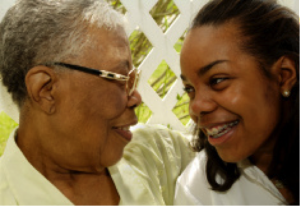CAREGIVER – PLANNING AHEAD
 Mom has Alzheimer’s disease…. what do we do?
Mom has Alzheimer’s disease…. what do we do?
Being a caregiver for a loved one diagnosed with Alzheimer’s disease and other dementia related illnesses can be an overwhelming task. This is especially true for many African American caregivers who oftentimes experience higher levels of stress than other racial and ethnic populations. Having a plan and being prepared for the challenges caregivers face helps to reduce conflict and stress but also supports the inclusion of other family members and the person diagnosed with Alzheimer’s disease to participate in discussions regarding their health care, finances, and future decisions regarding their independence and end of life arrangements.
Preparation for every stage of Alzheimer’s disease and other dementias is critical for not only the person living with the disease but for the caregivers as well. Each stage of cognitive health diseases comes with its own challenging and at times rewarding experiences and a key to success is having a plan. The journey of caregivers comes with good and bad outcomes. The tasks of caring for a loved one can help to strengthen family bonds and facilitate communication and compassion among family members. At the same time as the disease progresses, family dynamics can also become strained. Knowing what to expect, how a person’s dementia progresses, and what to do about it is important for caregivers and family members. The tips below are a great way to start the process.
Early Alzheimer’s disease Caregiving tips:
- Work with your loved one and their healthcare professional to understand the disease, its progression, and start making a plan for now and the future
- In early stages, support and encourage your loved one independence and ability to continue to care for themselves
- Begin to discuss financial concerns for both you and your loved ones. Discuss cost for medical expenses, income, and options for advanced care as the disease progresses
- Start identifying and building a support system in the early stages to help decrease stress and frustration as symptoms may worsen requiring more care and support for your loved one
Caregiving tips in later stages of disease:
- Continue to support your loved one’s independence as much as possible. Communicate the needs for more assistance or care for your loved ones and consult them in the options to consider at home and/or facility based care
- Take time to care for yourself. Caregivers can easily become overwhelmed with having to care for both their immediate family and a loved one diagnosed with Alzheimer’s disease or dementia. Remember to see your own doctor and take steps to maintain your own health and well-being
- Work with your loved one’s healthcare provider, insurance carrier, and/or family members to make decisions on advanced care options that have been discussed during the earlier stages of disease. This should include cost for the care and be based on decline in independence and self-care abilities of the person diagnosed
- Begin to discuss end of life options for your loved one making sure that advanced medical directives, wills, and financial arrangements have been addressed. This can be a difficult part of the planning process but doing it will help to decrease emotional tensions and uncertainty during the final moments with your loved one
